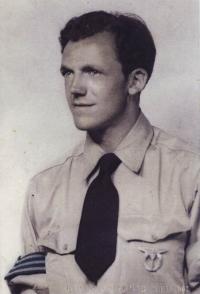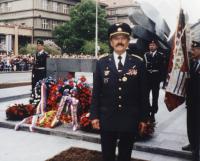“And as I was firing from my machine gun my feed belt got jammed. And I didn´t notice that the snout was overheated. I managed to remove it, but I realized that only after the shooting was over. My legs were shaking, I was being terrified, my back was sweating, but there was nothing to be afraid of anymore.”
Mr. Stanislav Mikula was born on May 2nd 1918 in Borsice village. In 1939 he left to Poland where he was fighting against Germans. With the back off he found himself in Soviet Union from where he was later taken to Middle East. Here he was involved in battle operations in Syria and Lebanon after Crete was occupied by Germans. After this he left to fight to Tobruk. He traveled thru Africa, Great Britain, North America, then to Bahamas. Here in Bahamas he underwent the anti-submarine training and then he was a pilot of the 111th British operating unit. Later he was put on the 311th unit also as a pilot. After the war he was working in the army until 1948. After the 1948 revolution as a west kind of soldier he worked mainly in working class professions. Later he was permitted to return to aircraft profession as a technician. He got rehabilitated after the year 1989.


